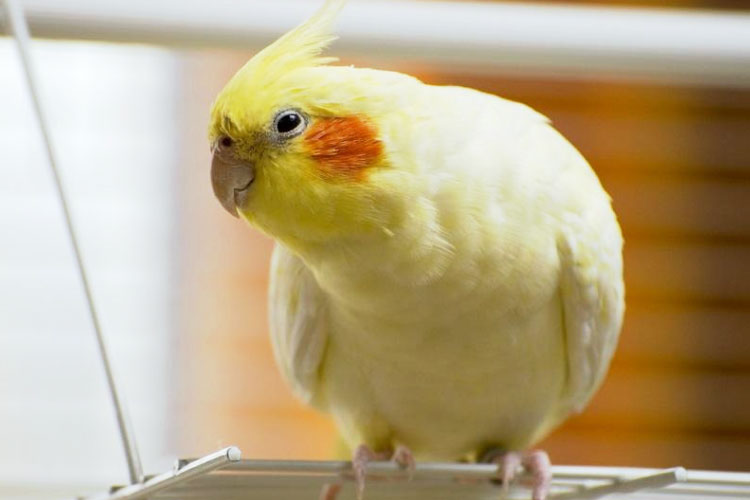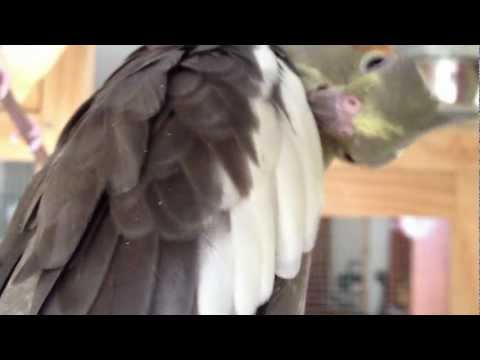Like humans, cockatiels also have several feel-good hormones, including dopamine and serotonin. Therefore, when the levels of these hormones are affected, your bird could become unhappy and depressed. This leads us to the question; how do you make a depressed and sad cockatiel happy?
One of the best ways to make your bird happy is to keep it stimulated throughout to prevent boredom. You can do this by providing it with a variety of toys. Other ways include:
- Keeping its birdcage clean
- Getting a companion bird
- Offering a varied diet
- Giving your bird maximum attention
But wait; how do you tell your bird is unhappy or depressed? You can learn this and much more in our guide below.
Do Cockatiels Get Sad And Depressed?
Yes. Like humans, cockatiels and other avian birds also have neurotransmitters or hormones in the brain, like serotonin and dopamine. These hormones affect your bird’s feelings of happiness.
For instance, serotonin helps regulate your bird’s mood, anxiety, and aggression. When the serotonin levels are normal, your cockatiel will feel happier. However, low levels of this hormone may make your bird sad and depressed.
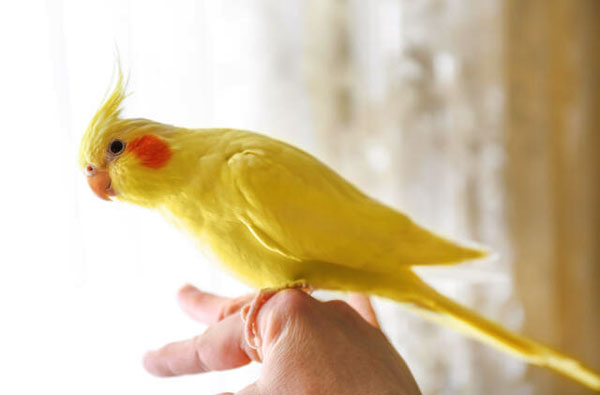
Similarly, low dopamine levels can make your cockatiel feel moody and depressed. This is because this hormone is responsible for making your bird feel good.
What Makes A Cockatiel Sad And Depressed?
Now that you know cockatiels do get sad and even depressed, perhaps you might want to know what causes all this. Check them out.
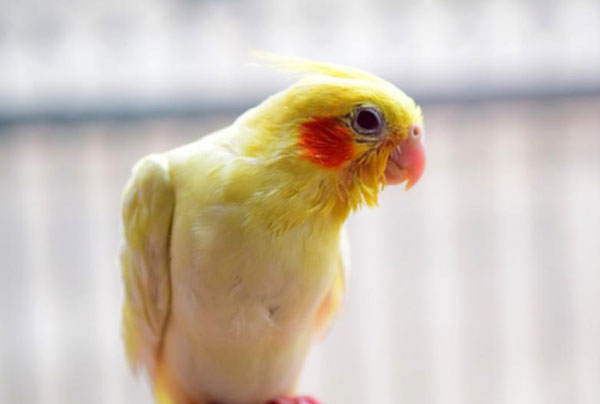
Boredom
Cockatiels need lots of mental stimulation and various daily enrichments to prevent boredom. When your bird is bored, it may engage in destructive behavior like biting cage bars which is a sign of depression.
Losing a mate or a companion
Like humans, a cockatiel will also mourn the death of a mate. During this period, your bird will go through a lot of sadness which could lead to depression.
Illness
Your cockatiel can become depressed because of an illness or injury. This is especially true if the injury or illness is left untreated for extended periods.
Abrupt routine change
When your bird is used to sleeping or feeding at certain times, changing its routine abruptly can significantly affect its mood. Also, suddenly changing the birdcage position can throw your bird’s mood off.
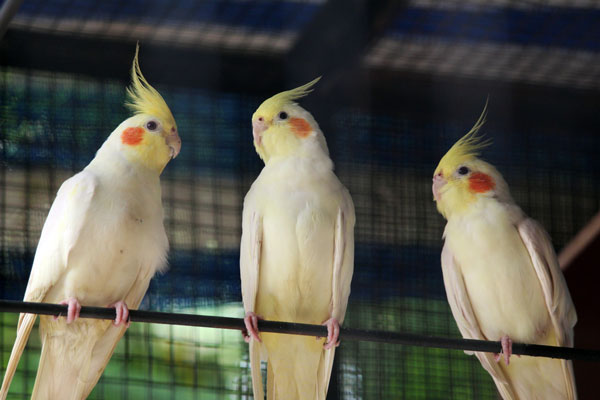
Temperature changes
A drastic drop or rise in temperatures could also stress your cockatiel. Your bird will get uncomfortable and even depressed due to the high and cold temperatures.
Unsanitary conditions
Keeping your cockatiel in unsanitary environments like a dirty cage could make it sad and depressed. These conditions could also lead to various health issues in your bird.
How To Tell Your Cockatiel Is Sad And Depressed
Your cockatiel can get sad or suffer from depression for many reasons. But what are signs to look out for to determine whether or not your bird is depressed.? Let’s find out.
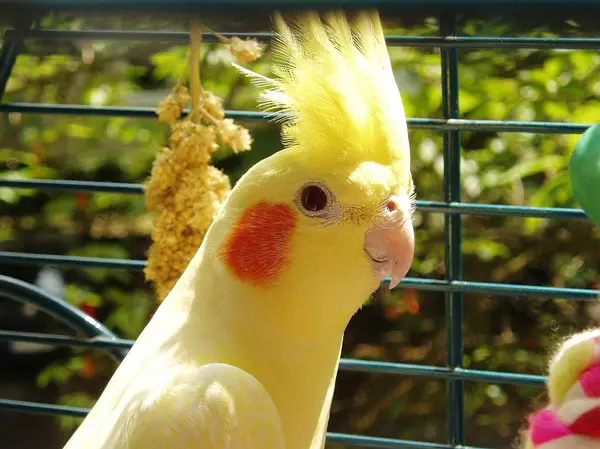
1. Feather plucking and self-mutilation
Your cockatiel will start plucking its feathers and eat into its own skin tissue when depressed and sad. Unlike feather plucking, self-mutilation is a life-threatening disorder where the bird can peck himself badly, causing severe injury.
Boredom can trigger this issue. Check out this video of a cockatiel plucking its feathers.
2. Decreased appetite and regurgitation
A cockatiel is more likely to experience reduced appetite and vomiting when sick. However, if your bird is stressed and depressed because of being in a new environment, it may refuse to eat.
3. Sudden behavior change
Some behavior changes may be due to hormonal issues. However, if your cockatiel starts acting aggressively, biting, or screaming, it could be suffering from chronic depression.
4. Irritability
It is usual for your cockatiel to be moody once in a while, especially when molting. But if you notice your bird suffering from excessive irritability, your cockatiel could be depressed or unhappy.
5. Head bobbing
Your cockatiel may bob its head for different reasons, including as a sign of happiness, anger, and when mating. When sad or depressed, your bird may also shake its head with the feathers puffed out and the crest standing up.
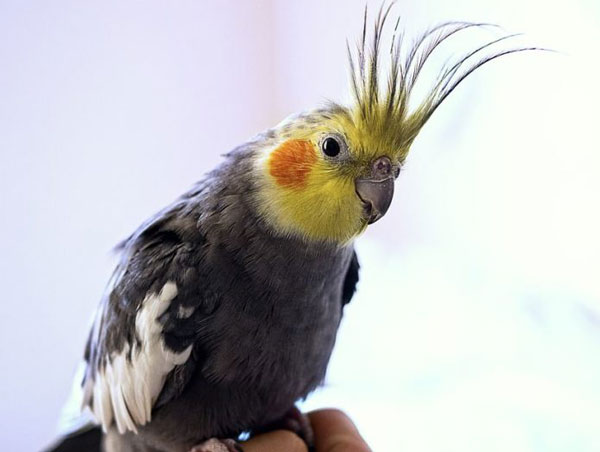
6. Stress bars on feathers
Another sign your cockatiel could be unhappy and depressed is stress bars on their feathers. The stress bars are black lines in the form of a cross on a bird’s feathers. These lines develop due to your bird being exposed to high-stress levels, anxiety, or an illness.
7. Lethargy and loss of interest in toys
Cockatiels are generally active and playful birds. So, if you notice any signs of inactivity or sudden loss of interest in its toys, your bird could be sick or depressed.
How To Make Depressed and Sad Cockatiel Happy
If you think your cockatiel could be unhappy and depressed, there are many effective ways to cheer up your bird. These include:
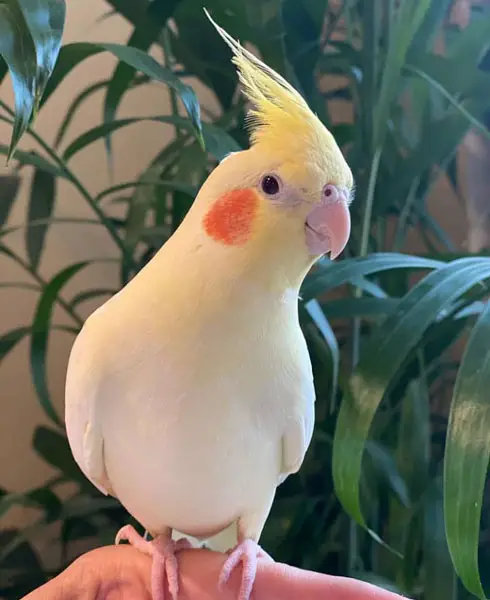
1. Consult an avian vet
One of the reasons your cockatiel could be sad and depressed could be because it is sick. So, you must see an avian vet to rule out any illness. The vet should do a complete check-up on your pet bird.
2. Offer a variety of toys
One way to make your depressed and sad cockatiel happy is by providing various colorful toys. The toys such as ropes, swings, bells, balls, beads, and ladders will stimulate the bird, reducing boredom. However, you must not let your bird play with the same toy for long.
3. Make time for your bird
Cockatiels are social birds. Therefore, you need to socialize with your bird daily for its emotional and psychological well-being. Your bird will be happy if you find time to play with it and teach it a few tricks.
4. Get a companion bird
If you only have one cockatiel, you can add another bird. A companion bird will make your cockatiel feel safer and calmer. Also, your cockatiel will be happier and less bored since it will have a partner to play with. You can put them in separate cages initially unless they get familiar with each other.
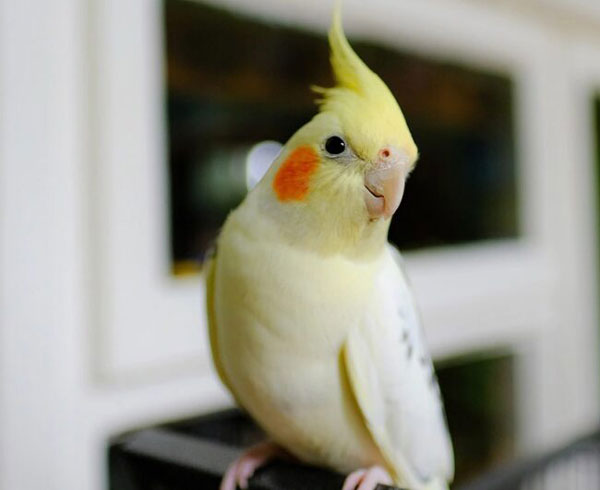
5. Allow enough playtime out of the cage
Ideally, your cockatiel should not spend the entire day in its cage. You must let the bird out for at least 2 hours daily to stretch its wings and exercise. Also, your cockatiel will be happy if you take it outdoors to experience different smells, sounds, and sights.
6. Place the cage in a comfortable spot
Check the position of your cockatiel’s birdcage. If the cage is near a window or outside the door, move it away to protect it from rapid temperature changes.
7. Clean the cage
Your bird can get depressed and sick from living in a dirty cage. Therefore, regularly cleaning its enclosure is the best way to make your cockatiel happy. Make sure to change the cage liner, remove leftover foods, and wipe down the cage surfaces.
8. Feed your bird a balanced diet & give occasional treats
A healthy cockatiel is a happy bird. Therefore, ensure that your bird has a varied diet comprising fresh fruits, vegetables, and seed mixes. Also, give your bird a variety of healthy treats but in moderation.
Can A Depressed And Sad Cockatiel Die?
No. However, chronic depression and unhappiness can affect your cockatiel’s physical and immune systems. For instance, your bird may lose a lot of weight or suffer from nutritional deficiencies when depressed because of eating less.
Additionally, your cockatiel may permanently damage its feather follicles due to constant self-mutilation and feather picking. As a result, new feathers may not grow, and the skin could become scarred.
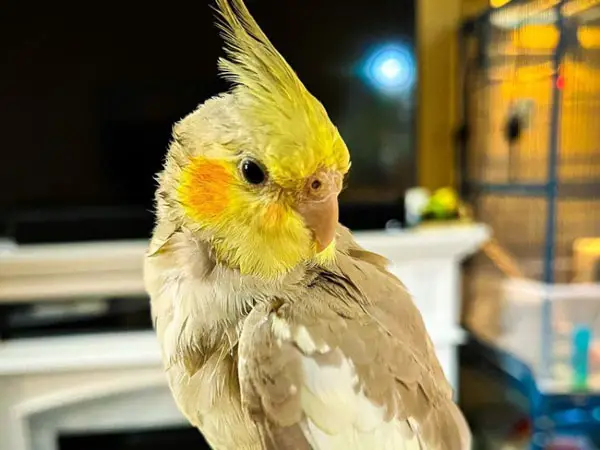
If you have a sad and depressed female cockatiel, it may have problems laying eggs. Your bird could even suffer from egg-binding, in which your cockatiel cannot expel the egg from the body.
FAQs
Before we conclude our guide, let’s look at frequently asked queries regarding how to make a sad and depressed cocktail happy.
No, as long as the birdcage is spacious and your cockatiels don’t spend all their time locked inside, they’re fine. Typically, cockatiels view their cage as safe places where they play, eat, and sleep without worrying about potential predators.
Your cockatiel may exhibit a sudden change of behavior, like biting and screaming. In addition, the bird may engage in feather-picking and suffer from reduced appetite.
If your bird is sad and depressed for an extended period, this could lead to various self-destructive behaviors like self-mutilation. Your cockatiel’s overall health may also be affected.
Outro
A cockatiel can get depressed and sad for many reasons, including inadequate stimulation, sickness, and extreme temperature changes. The good news? There are many signs to look out for to be sure your bird is depressed.
Even better, there are several ways to make your sad and depressed cockatiel happy, like offering plenty of toys, introducing a companion, or giving occasional treats.
